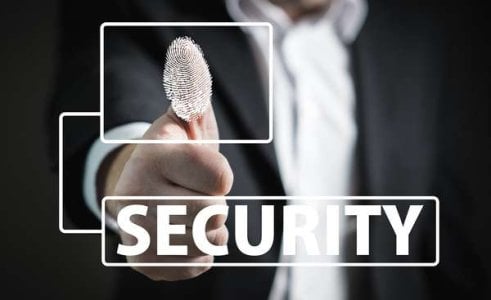Your face and fingerprint might soon be your myGov password
- Replies 35
Online scams and cybercrime are becoming frighteningly common in Australia. New figures reveal Australians have already lost a staggering $3.1 billion to scams this year alone.
To fight back against these tech-savvy thieves, the federal government has announced an upgrade to myGov security—biometric authentication using your face or fingerprint.
Government Services Minister Bill Shorten said: 'Passkeys will be introduced to bring myGov further into the 21st century, allowing Australians the ability to use biometric options such as facial recognition to access the site.'
'These important sign-in alternatives are familiar to many Australians and are a key safeguard against scammers who use phishing tactics to harvest personal information like people's date of birth to fraudulently access accounts.'

Recently, the government shared concerns about thousands of myGov accounts being suspended each month due to potential breaches by 'scam-in-a-box' kits sold on the dark web.
Government sources suspect that people often reuse their passwords, making it easier for scammers to access other accounts with stolen passwords.
These scam-in-a-box kits help create fake websites and provide the necessary knowledge for launching phishing attacks on accounts such as Centrelink, the Australian Tax Office, and Medicare.
Some kits even come with security controls, enabling criminals to run multiple scams simultaneously and quickly close them to avoid detection.
In certain cases, these kits can identify more IT-savvy users and redirect them to the official myGov website. The fake websites they create often closely resemble the real ones.
For instance, an advertisement encourages buyers by stating that most Australians have a myGov account. It suggests obtaining login details and ensuring the Australian Tax Office is linked to the account.
In addition to introducing biometric authentication, Shorten also revealed plans for a new advisory group aimed at prioritising customer needs within myGov.
This group, recommended after a user audit, will be led by Victor Dominello, the former NSW Minister for Customer Service and Digital Government
Joining Dominello on the panel are Ed Santow, former Human Rights Commissioner; Simon Longstaff, Executive Director at The Ethics Centre; and Karen Batt, Victorian Secretary of the Community and Public Sector Union.
'[They] bring strong, balanced and wide-ranging insights across fields such as governance, service delivery ethics, use of technology in digital service delivery and advocacy for both customers and service delivery staff,' explained Shorten.
This announcement comes after Scamwatch recently warned of a text message scam claiming to be from myGov and offering recipients $750 in 'economic support payments'.
To 'apply', users are instructed to click on a link and provide their banking details before the 'support' expires.
This is just the latest in many phishing scams aimed at unsuspecting myGov users. Experts say the large user base and sensitive personal data associated with myGov accounts make them attractive targets.
Other common myGov scams include fake 'account verification' emails and texts with links to fake login pages designed to steal usernames and passwords.
One sample of this email was sent by our member @Maurice F. last month. The email stated that the 'refund is ready' and asked the recipient to sign in by clicking the link provided. (You can read more about that story here.)
Scammers may also impersonate myGov via phone calls, asking for personal details like birth dates and addresses under the guise of 'updating records'.

Members, what do you all think about the government's move to add passkeys for myGov accounts to protect against scammers?
Do you find face or fingerprint recognition more user-friendly than traditional usernames and passwords? And do you think they're more effective? Share your thoughts in the comments below!
To fight back against these tech-savvy thieves, the federal government has announced an upgrade to myGov security—biometric authentication using your face or fingerprint.
Government Services Minister Bill Shorten said: 'Passkeys will be introduced to bring myGov further into the 21st century, allowing Australians the ability to use biometric options such as facial recognition to access the site.'
'These important sign-in alternatives are familiar to many Australians and are a key safeguard against scammers who use phishing tactics to harvest personal information like people's date of birth to fraudulently access accounts.'

The Australian government will introduce passkeys for myGov accounts to try to safeguard them from scammers. Credit: Pixabay.
Recently, the government shared concerns about thousands of myGov accounts being suspended each month due to potential breaches by 'scam-in-a-box' kits sold on the dark web.
Government sources suspect that people often reuse their passwords, making it easier for scammers to access other accounts with stolen passwords.
These scam-in-a-box kits help create fake websites and provide the necessary knowledge for launching phishing attacks on accounts such as Centrelink, the Australian Tax Office, and Medicare.
Some kits even come with security controls, enabling criminals to run multiple scams simultaneously and quickly close them to avoid detection.
In certain cases, these kits can identify more IT-savvy users and redirect them to the official myGov website. The fake websites they create often closely resemble the real ones.
For instance, an advertisement encourages buyers by stating that most Australians have a myGov account. It suggests obtaining login details and ensuring the Australian Tax Office is linked to the account.
In addition to introducing biometric authentication, Shorten also revealed plans for a new advisory group aimed at prioritising customer needs within myGov.
This group, recommended after a user audit, will be led by Victor Dominello, the former NSW Minister for Customer Service and Digital Government
Joining Dominello on the panel are Ed Santow, former Human Rights Commissioner; Simon Longstaff, Executive Director at The Ethics Centre; and Karen Batt, Victorian Secretary of the Community and Public Sector Union.
'[They] bring strong, balanced and wide-ranging insights across fields such as governance, service delivery ethics, use of technology in digital service delivery and advocacy for both customers and service delivery staff,' explained Shorten.
This announcement comes after Scamwatch recently warned of a text message scam claiming to be from myGov and offering recipients $750 in 'economic support payments'.
To 'apply', users are instructed to click on a link and provide their banking details before the 'support' expires.
This is just the latest in many phishing scams aimed at unsuspecting myGov users. Experts say the large user base and sensitive personal data associated with myGov accounts make them attractive targets.
Other common myGov scams include fake 'account verification' emails and texts with links to fake login pages designed to steal usernames and passwords.
One sample of this email was sent by our member @Maurice F. last month. The email stated that the 'refund is ready' and asked the recipient to sign in by clicking the link provided. (You can read more about that story here.)
Scammers may also impersonate myGov via phone calls, asking for personal details like birth dates and addresses under the guise of 'updating records'.
Key Takeaways
- The Australian federal government has declared an overhaul of the myGov online system to introduce passkeys like face and fingerprint recognition in place of usernames and passwords in an effort to combat scams.
- myGov accounts, which host sensitive data from Centrelink, the Australian Tax Office and Medicare, have been targeted by criminals using 'scam-in-a-box' kits, leading to billions of dollars being lost.
- Government Services Minister Bill Shorten announced the changes as a safeguard against scammers who use phishing tactics to steal personal information.
- Additional safety measures include the formation of an advisory group to ensure myGov prioritises customers; former Human Rights Commissioner Ed Santow, Simon Longstaff from The Ethics Centre, and Karen Batt from the Community and Public Sector Union will participate in the panel.
Members, what do you all think about the government's move to add passkeys for myGov accounts to protect against scammers?
Do you find face or fingerprint recognition more user-friendly than traditional usernames and passwords? And do you think they're more effective? Share your thoughts in the comments below!








